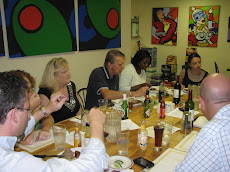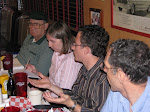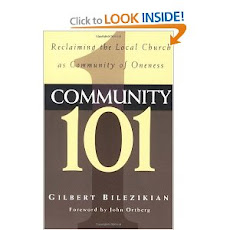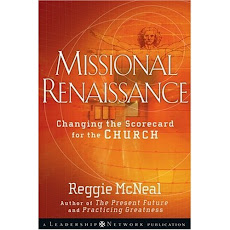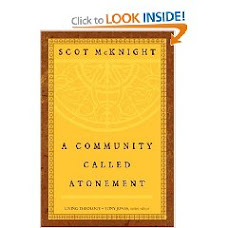
Nine of us met to continue our discussion on decentralized networking and start looking at Alan Hirsch’s excellent book
The Forgotten Ways – reactivating the missional church.
http://www.theforgottenways.org/%20 (Thanks Flavio for the loan.) Jerry and Kennedy joined us as newcomers, both of whom are current or former ordained ministers in mainline denominations. I also took a turn to “tell my story” of how I came to the emerging conversation. I include that re-cap at the end of this post since it is longish. (Please forgive me if my lack of objectivity makes it harder for me to condense my own story than those of others.)
Jumping right in, Hirsch says, “Existing relationships with believers and nonbelievers alike become the very fabric of the church. There ought to be nothing artificial about it. Planting a new church or remissionalizing an existing one, in this approach isn’t primarily about buildings, worship services, size of congregations, and pastoral care, but rather about gearing the whole community around natural discipling friendships, worship as a lifestyle, and mission in the context of everyday life. As a living network “in Christ” it can meet anywhere, anytime and still be a viable expression of church. This is a much more organic way to plant a church or to revitalize it.” In my frustrating quest to find a sound-bite to describe the emerging / missional church movement, I could stop right here.
Hirsch compares the phenomenal growth of the persecuted church in China to that of the first three centuries of the early church. He tells an ironic story of a meeting between Chinese leaders from the underground church and a group of Western leaders. The Chinese asked for prayers in several areas: 1) The government still did not allow them to meet in groups larger than fifteen people. 2) The government did not allow them to have their own building. They were forced to meet in homes, cafés, karaoke bars, and social clubs. 3) They were forbidden to develop separate organizations to train leaders; they were forced to train leaders in the local church. While no one advocates state control of religion, the Western leaders had a hard time praying in these ways and concluded that the Chinese government was unwittingly helping the church there to remain “more true to itself.”
We started to look at several of Hirsch’s charts comparing the “Organic Missional Movement” (AD 32-313 and past 10 years) to “Institutional / Christendom” (313 to current). We got as far as the first item, “locus of gathering,” and discussed the role and need for (or not) dedicated “church” buildings. How do such building impact: size of gatherings; how we use limited financial resources; how we worship collectively; how we relate to one another; how different people can feel included or excluded? Some felt that different venues could be good for different purposes at different times, depending on the purpose of the gathering. Many agreed on the importance of small, relational and missional groups, regardless of the venue. And many agreed that some of the unintended consequence of “buildings becoming central to the notion, and experience, of church” is depersonalization and usurpation of resources that could be used for missional purposes. Kathy asked if church is supposed to connect us to a “church family” on an ongoing basis, or be a constantly changing group of people. My own answer is that we all need a core group of friends, for which we are the wind in each other’s sails, but that we always need to reach out to others.
Finally, Jerry asked me, “Where is this all headed?” This question has come up before. My answer continues to be “I have no idea.” That’s my story, and I’m sticking to it. I shared how our “cohort” was inspired by nearly a hundred other such cohorts found at
http://www.emergentvillage.com/ where they are described as “[Friends who] meet of their own accord, at their own time and place, and discuss what they choose. What binds the cohorts together is a common desire to be in robust and respectful conversation about things that matter.” I said that I am a facilitator. "Where we go" is up to the group. Some have suggested more frequent meetings. Some have suggested additional gatherings with a more relational focus. Some have asked if we should “become a church?” My answer has always been that we
are “church” when we gather, and we all have many talents and abilities. But I see no reason that our gatherings need to replace attendance at a “church” where anyone feels led to attend now.
At the same time, it is my hope that we all continue to grow in the areas of, “community around natural discipling friendships, worship as a lifestyle, and mission in the context of everyday life.” And if this gathering can help that growth in each of us, that is an end in itself. I would add that for me, this journey is an exciting and at times scary experience, somewhat like driving up a narrow, curving mountain road in the fog where you can only see as far as your headlights reflecting off the next rock.
Ok. Here’s “my story”…
I attended Presbyterian Sunday School as a child, was baptized at a Baptist Church as a young teen (after having read
The Late Great Planet Earth by Hal Lindsay) and eventually joined a non-denominational charismatic church as a young adult. In the 80s I I worked doing fund raising for a para-church group at churches of all denominations, both Protestant and Roman Catholic (where I also had opportunities to visit El Salvador, Colombia and Germany). Through the experience of meeting sincere “Spirit led” Christians in every denomination, and studying their histories and doctrines, I came to the conclusion that there was no longer a rational basis, for me as a Christian anyway, to choose allegiance to any one denomination. After we were married, my wife and I decided to attend The Salvation Army Church, which is the church she grew up in and which began as a missional movement in the mid-1800s. However, I remain a non-denominational, evangelical (now emerging) Christian.
As a teen, I struggled with the legalism of the fundamentalist church I attended. Finally I came across Romans 13:8: “Let no debt remain outstanding, except the continuing debt to love one another, for he who loves his fellow[human] has fulfilled the law.” This verse, and the verses following, have become “life verses” for me on this issue.
Always interested in the “human problem,” (Why do humans, including me, have so many struggles?) I majored in Psychology with a minor concentration in Political Science and courses in New Testament. But I struggled with choosing the best approach to lead to solutions (Personal? Systemic change? Faith?). Having grown up on the edge of the Everglades, and Hollywood Beach before that, at the age of 18, I co-founded a local environmental coalition and later led a political action committee to help elect conservation oriented candidates. Afterwards, I started working with the homeless, first through a para-church group, then as a mental health outreach worker, later as an advocate and shelter director and finally in my current job as an administrator.
A few years ago, a friend of mine who had gone to seminary started sending me emails and having conversations with me which challenged assumptions about how we do church, how we relate both as Christians and to the “unchurched,” and how we truly grow in our journey in Christ to love God and one another. Another friend gave me a book for Christmas, Brian McLaren’s “The Secret Message of Jesus.” I read the book with my heresy meter turned all the way on. I found no heresy, but did find an eye opening adventure allowing me to see the Kingdom of God all around me, when I take the time to look.
I soon found in the emerging / missional church movement that:
There is a de-emphasis on waiting for the "rapture" and a renewed sense of wonder in the Kingdom of God here and now, and our responsibility today for doing God’s will on earth as it is in heaven.
I could reconcile the false dichotomies I had set up between psychology, politics (systemic change) and Christ-following. God can and does use all of the above to reconcile us, and the world, to Himself and each other. As Scot McKnight puts it,
Atonement goes in four directions: Reconciliation with God, within oneself, with others and with the world.
That reconciliation with the world included creation care, which is unfortunately devalued in many evangelical churches and relegated to “liberal politics.”
That my growing frustration with not finding a niche in the church I attended had more to do with how church had become institutionalized than it had to do with me. Our pastor gave me the book,
The Present Future by Reggie McNeal, that spelled out the shortcomings of institutional church in stark terms. At the same time, I was learning more about missional, organic and house church movements where relationship, empowerment, community and worship as a way of life are emphasized over programs, “pulpit to pew” teaching, capital campaigns for church buildings and church being defined as a one hour meeting on Sunday morning.
I found in his book
Generous Orthodoxy, how Brian McLaren celebrates all that is good with every denomination, while recognizing the limits of denominationalism.
I found that the emerging church movement advocates a “purple politics” (Jim Wallis, McLaren, Sojourners, Shane Claiborne) which does not assume that evangelical Christians need to embrace either a conservative (Republican red) or liberal (Democratic blue) agenda to follow Christ.
That, while generally evangelistic and Christ-centered, the emerging church movement questions legalistic absolutes, while promoting freedom in Christ, along with accountability as a natural outgrowth of friendships. And that accountability can be more horizontal than hierarchical. The Body of Christ is organic and living instead of mechanical.
And I found a missional emphasis which calls the marginalized (the homeless, the rejected, the outcast) to the table of fellowship in Christ with us.
So, the answer to what has led me to this conversation is simply every experience in my life. They have led me to what Phyllis Tickle calls, “The Great Emergence,” both in my journey and the journey of the church.
Blessings,
Steve
 “The poverty in the West is a different kind of poverty---it is not only a poverty of loneliness but also of spirituality. There’s a hunger for love, as there is a hunger for God… In the West there is loneliness, which I call the leprosy of the West. In many ways it is worse than our poor in Calcutta.”
“The poverty in the West is a different kind of poverty---it is not only a poverty of loneliness but also of spirituality. There’s a hunger for love, as there is a hunger for God… In the West there is loneliness, which I call the leprosy of the West. In many ways it is worse than our poor in Calcutta.”



